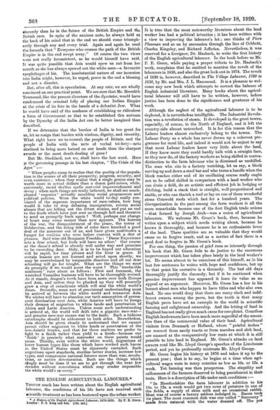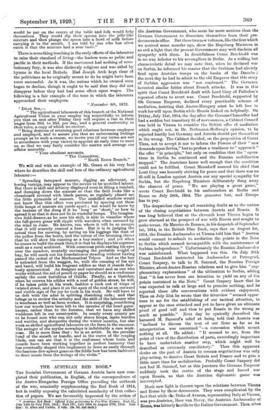THE ENGLISH AGRICULTURAL LABOURER.* TH011011 much has been written about
the English agricultural labourer, the conditions of his life have not received such scientific treatment as has been bestowed upon the urban worker.
• A Ilisfory of the English Agricultural Labourer. 1870-1920. By F. E. Green. London : P. S. King and Bon. Lies. net.]
It is true that the most noteworthy literature about the land worker has had a political intention ; it has been written with a view to improving the labourer's lot ; one thinks of Piers Plounnan and so on by succession through the lino of Cobbett, Charles Kingsley, and Richard Jefferies. Nevertheless, it was reserved for a foreigner, Dr. Hasbach, to write the first history of the English agricultural labourer. In the book before us Mr. F. E. Green, while paying a proper tribute to Dr. Haabach's work, complains that he omitted to mention the revolt of the labourers in 1830, and also the great lock-out in 1874. The revolt of 1830 is, however, described in The Village Labourer, 1760 to 1830, by Mr. and Mrs. J. L. Hammond. It is a pleasure to wel- come any new book which attempts to correct the balance of English industrial literature. Many books about the agricul- tural labourer will still have to be written, however, before justice has been done to the significance and greatness of his work.
Although the neglect of the agricultural labourer is to be deplored, it is nevertheless intelligible. The Industrial Revolu- tion was a revolution of steam. It developed in the great towns, especially, of course, in the North of England, and it left the country-side almost untouched. It is for this reason that the Labour leaders almost exclusively belong to the towns. The Labour Party as a whole has never drawn up a coherent pro- gramme for rural life, and indeed it would not be unjust to say that most Labour leaders know very little about the land, If they knew more they could hardly talk with a straight face, as they now do, of the factory workers as being skilled in contra- distinction to the farm labourer who is dismissed as unskilled. The man who sits in a factory watching, let us say, a block moving up and down a steel bar and who turns a handle when the block reaches either end of its oscillating course really ought not to be called skilled in comparison with a land worker who can drain a field, do an artistic and efficient job in hedging or ditching, build a stack that is straight, well-proportioned and stable, or who can thatch a roof or lay on one of those wonderful stone Cotswold roofs which last for a hundred years. The disorganization in the past among the farm workers is all the more remarkable because one of the first English trade unions —that formed by Joseph Arch—was a union of agricultural labourers. We welcome Mr. Green's book, then, because he writes upon a subject which needs writing about, because ho knows it thoroughly, and because he is an enthusiastic lover of the land. These qualities are so valuable that they would cause us to forgive much, and as a matter of fact there is a good deal to forgive in Mr. Green's book.
For one thing, the passion of grief runs so intensely through his book that Mr. Green fails to do justice to the enormous improvement which has taken place lately in the land worker's lot. He seems almost to be conscious of this himself, as in his last few sentences he writes with hope and confidence, but up to that point his narrative is a threnody. The bad old days thoroughly justify the threnody, but if it be continued when genuine improvement has appeared it loses its value as an appeal or an argument. Moreover, Mr. Green has a bee in his bonnet about men who happen to have titles and who also own land. No one would deny that there are many slack and indif- ferent owners among the peers, but the truth is that many English peers have set an example to the world in scientific farming and enlightened ownership. And the letting of land in England has not really given much cause for complaint. Countless English landowners have been much more regardful of the ameni- ties than of the commercial value of their land. Agricultural visitors from Denmark or Holland, where " painful inches " are rescued from sandy tracts or from marshes and slob land, are amazed at the comparatively low rents at which it is still possible to hire land in England. Mr. Green's attacks on land owners read like Mr. Lloyd George's speeches of the Limehouse period, and yet he profoundly mistrusts Mr. Lloyd George.
Mr. Green begins his history at 1870 and takes it up to the present year ; that is to say, he begins at a time when agri- cultural wages were in many counties as low as 10s. or 12s. a week. Yet farming was then prosperous. The stupidity and callousness of the farmers deserved to bring punishment in their train. Here is a description of life under such conditions :- " In Herefordshire the farm labourer in addition to his 10s. to 12s. a week would get two rows of potatoes in one of the fields, a supply of skim milk and an occasional rabbit. Meat was of course a luxury seldom indulged in. Bacon took its place. The most common dish was one called " flummery made from oatmeal with the water drained off. The pot
wound be put on the centre of the table and folk would help themselves. They would dip their spoons into the jelly-like mixture and then plunge the spoon into a bowl of milk before carrying it to the mouth. I am told by one who has often eaten it that the mixture had a sour taste."
There is something touching in the early efforts of the labourers to raise their standard of living—the leaders were so polite and pacific in their methods. If the movement had nothing of revo- lutionary fury, it was also distinctly religious and was aided by hymns in the local Bethels. Had Joseph Arch kept clear of the politicians as he originally meant to do he might have been more successful. As it was, the unions which he created soon began to decline, though it ought to be said that they did not disappear before they had had some effect upon wages. The following is a fair example of the tone in which the labourers approached their employers.
"November 6th, 1872. " DEAR SIR,- " The agricultural labourers of this branch of the National Agricultural Union in your employ beg respectfully to inform you that on and after Friday they will require a rise in their wages from 20d. to 28d. per day, and a general conformity to their rules, a copy of which we enclose. " Being desirous of retaining good relations between employer and employed, and to assure you that no unbecoming feelings prompt us to such a course, we invite you (if our terms are not in accordance with your views) to appoint an early time to meet us, so that we may fairly consider the matter and arrange our affairs amicably.
" Your obedient servants, " The Committee, " North Essex Branch."
We will end with an example of Mr. Green at his very best where he describes the skill and lore of the ordinary agricultural labourer:— "Spreading farmyard manure, digging an allotment, or hoeing turnips, may appear to the novice to be unskilled labour. But there Is skill and artistry displayed even in filling a tumbril, and dumping down the manure no that the field looks like a chessboard covered with black pawns, so regularly placed are the little pyramids of manure. The unskilled aesthete would not know that this effect was produced by spacing out these little heaps of manure six yards apart ; nor would he know by the texture of the dung if it be long' or `short,' or how to spread it so that it does not lie in wasteful lumps. The imagina- tive field-dresser,as he uses his skill, is able to visualise where the full-grown grass will ripple with wavelets when caressed by the wind in June. He knows, too, where it will be so meagre that it will scarcely conceal a hare. But it is in judging the actual time for mowing, by noting on his leggings the dust of the pollen from the bents, and the colour of the bronzing clover that he will show his cunning as a hay-maker ; and yet when he comes to build the stack then it is that he displays his supreme oraft as a rural architect. With conscious pride casting his eyes over the meadow, mentally envisaging the probable weight of hay, he will mark out his foundation or steading without having passed the ordeal of the Mathematical Tripes. And as the hay is unloaded from the waggon, he, with the cunning of his eye and hand, will build his fragrant edifice so that it stands flaw- lessly symmetrical. As designer and executant and as one who works without the aid of pencil or paper he should as a craftsman satisfy the most fastidious of Guilds. Finally, as a thatcher, when he crowns his edifice with a roof of golden straw, he will, if he takes pride in his work, fashion a cock out of wisps of twisted straw, and place it on the apex of the roof as an outward and visible sign of the joy he took in his work. He will have to be deft with the adze in splitting thatching rods ; and that brings us to review the artistry and the skill of the labourer who is woodman as well as farm worker. It is surprising, considering how our woods have been left to the mercies of the head game- keeper, rather than to the forester, that we have any skilled woodmen left in our countryside. In nearly every county are to be found men who can not only shave hoops, make hurdles and wattles, and sheeperibs during the winter months, but also work as skilled agricultural labourers on the farm in the Rummer. The swinger of the scythe nowadays is indubitably a rare work- man. He is more than that : he is an artist. In the peculiar bend of the sneath or handle, and in the curve of the reaping blade, one can see that it is the craftsman whose brain and muscle have been working together in perfect harmony that has eventually shaped this implement to draw as easily through the luscious dew-sprent grass as the fiddle bow has been fashioned to draw music from the strings of the violin."







































 Previous page
Previous page